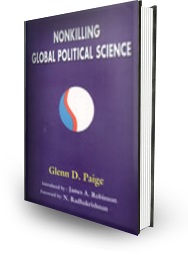 First edition | |
| Author | Glenn D. Paige (1929–2017) |
|---|---|
| Language | English |
| Subject | Nonkilling |
| Publisher | Xlibris, Center for Global Nonkilling |
Publication date | 2002 |
| Publication place | United States |
| Pages | 267 |
| ISBN | 0-7388-5745-9 |
| OCLC | 45093643 |
Nonkilling Global Political Science is a 2002 book written by political scientist Glenn D. Paige. In his book, Paige challenges the violence-accepting assumptions of the discipline of political science as a whole. Paige introduces the concept of nonkilling, which refers to the absence of killing, threats to kill, and conditions conducive to killing in human society. [1] [2]
Contents
The book has been translated into over two dozen languages [3] and had led to convening the First Global Nonkilling Leadership Forum in Honolulu, Hawai‘i, 1–4 November 2007. [4] The book spurred the creation of the Center for Global Nonkilling, a United Nations special consultative status nongovernmental organization, and has subsequently led to a body of scholarship, [5] [6] [7] including dedicated issues in peace and conflict study journals. [8]